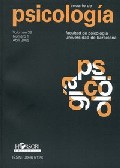Memoria operativa y procesos de integración en la comprensión de textos
Paraules clau:
Working Memory, Reading Span, Reading Comprehension, Regressive Fixations.Resum
The aim was to examine the influence of working memory capacity on the integration of information across sentences during reading. Subjects high or low in reading span read texts under three conditions: (a) reading regressions and self-paced reading allowed, (b) self-paced reading (no regressions), and (e) fixed-pace reading (no regressions or selfpaced reading). Two kinds of regressive fixations - between- and withinsentence- were measured; and two types of comprehension questions - detail and integration - were used. The results indicated that (a) highspan subjects made more regressive movements, especially between-sentence regressions, than low-anxiety subjects; but (b) comprehension performance and efficiency were lower for low-span than for high-span readers, with both integration and detail questions, under all three reading conditions. The findings on regressive movements are consistent with the idea that subjects low in working memory capacity resort to reading regressions as un auxiliary strategy to carry out integration processes, in order to compensate for their capacity lirnitations. In contrast, the data concerning comprehension suggest that the frequent use of regressive fixations and reading time by readers low in working memory capacity is not a real compensatory mechanism for comprehension, but has a metacognitive function which provides reassurance. Defcits in working memory capacity constrain reading comprehension in general, but not specifically integration processes.Descàrregues
Publicades
1996-01-13
Número
Secció
Articles
Llicència
El/la autor/a que publica en esta revista está de acuerdo con los términos siguientes:
El/la autor/a cede en exclusiva todos los derechos de propiedad intelectual al/la editor/a para todo el mundo y toda la duración de los derechos de propiedad intelectual vigentes aplicables.
El/la autor/a puede difundir una copia de sus artículos respetando la política de acceso libre de la revista.


